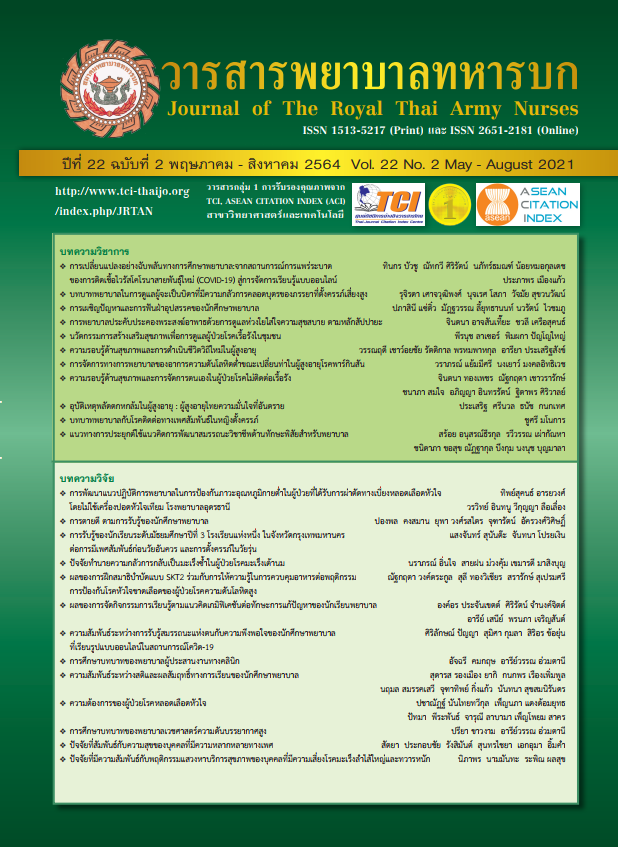Good Death as Perceived by Nursing Students
Keywords:
Good Death, Nursing Students, PerceivedAbstract
This qualitative research aimed to describe good death as perceived by nursing students. Heidegger humanistic phenomenology was applied as research methodology. The participants were 15 nursing students who had experienced the loss of a family member while studying in the Faculty of Nursing. Data were collected using in-depth interviews with audio-recorded, and field observations. Data was analyzed using content analysis method of The Van Manan. The findings of this study are consisted of 7 themes: 1) having knowledge to be the door for good death, 2) having relationship to enhance the supporting and caring, 3) Creative communication and prepare with mutual understanding, 4) Live every moment with value and meaning, 5) Caring the body and mind by nothing suffering, 6) Psychological needs are meet, 7) Spiritual beliefs are not ignored.
Downloads
References
WHO Definition of Palliative Care. Palliative Care: symptom management and end of life care. WHO Publications. 2012.
Tongprateep T. Nurse: being with the dying. 3rded. Bangkok: V print 1991; 2010. (in Thai)
Kongsuwan W. Nursing for critically ill patients at the end stage of life with technology. 2rd ed. Songkla: Chanmeangkanpim Bangkok. 2016. (In Thai).
Granda-Cameron C., & Houldin, A. Concept analysis of good death in terminally ill patients. American Journal of Hospices & Palliative Medicine. 2012; 29(8): 632-639.
Nilmanat K. the End of Life Care. Songkla: Chanmeangkanpim Bangkok. 2012. (In Thai).
Kongsuwan, W., Keller, K., Touhy, T., & Schoenhofer, S. Thai Buddhist intensive care unit nurses’ perspective of a peaceful death: An empirical study. International Journal of Palliative Nursing 2010; 16(5): 241-247. (in Thai)
Kunsongkeit W. Good Death as Perceived by the Cancer Patients. The Journal of Faculty of Nursing Burapha University. 2013; 21(4): 25-36. (in Thai)
Samerchua W, Nantachaipan P. & Sittisombut, S. Good Death as Perceived by the Cancer Survivors. Nursing Journal. 2019; 46(1): 49-61. (in Thai)
Kongsuwan W, Chaipetch O, & Matchim, Y. Thai Buddhist families’ perspective of a peaceful death in ICUs. British Association of Critical Care Nurses. 2012; 17(3): 151-159.
Kunsongkeit, W. Good Death as Perceived by the Patients’ Family Members. The Journal of Faculty of Nursing Burapha University. 2015; 25(3): 41-55. (in Thai)
Kunsongkeit, W. Good Death as Perceived by the Professional Nurse. The Journal of Faculty of Nursing Burapha University. 2014; 22(3): 69-86. (in Thai)
Jompaeng, Y. & Sangchart, B. Nurse’s Perception of a Good Death: a Phenomenology Study. Journal of Nursing Science & Health. 2013; 36(3): 49-59. (in Thai)
Ngamgam, S., & Sangchart, B. Buddhist Monks’ Perceptions Concerning Good Death. the National and International Graduate Research Conference. 2016; 645-655. (in Thai)
Thongdam, R., Kongsuwan, W., & Nilmanat, K. Thai Muslim Nurses’ Perspective of a Peaceful Death. Songklanagarind Journal of Nursing. 2013; 35(2): 21-34. (in Thai)
Oumtanee, A., Qualitative Research in Nursing. Bangkok: Chulalongkorn University Press; 2016. (in Thai)
Siriso, J., Thanasilp, S., & Pudtong, N. Selected Factors Related to the Quality of Death of Persons with Terminal Cancer as Perceived by Family Caregivers. Journal of Nursing Science Chulalongkorn University. 2017; 29(2): 112-123. (in Thai)
Khongsaman, P., Kespichayawattana, J., & Chimluang, J. Factors Related to Death Anxiety among Family Caregivers of Advanced Cancer Patients. Kuakarun Journal of Nursing. 2019; 27(1), 85-97. (in Thai)
Jamjan L. & Chaleoykitti S. Trend of Palliative Care in the Bachelor of Nursing Science Curriculum. Journal of The Royal Thai Army Nurses. 2017; 18(1): 22-28. (In Thai).
Downloads
Published
How to Cite
Issue
Section
License
บทความหรือข้อคิดเห็นใดใดที่ปรากฏในวารสารพยาบาลทหารบกเป็นวรรณกรรมของผู้เขียน ซึ่งบรรณาธิการหรือสมาคมพยาบาลทหารบก ไม่จำเป็นต้องเห็นด้วย
บทความที่ได้รับการตีพิมพ์เป็นลิขสิทธิ์ของวารสารพยาบาลทหารบก
The ideas and opinions expressed in the Journal of The Royal Thai Army Nurses are those of the authors and not necessarily those
of the editor or Royal Thai Army Nurses Association.






